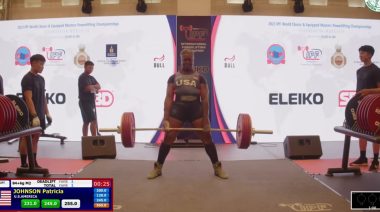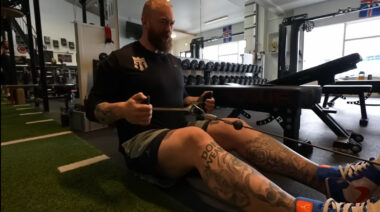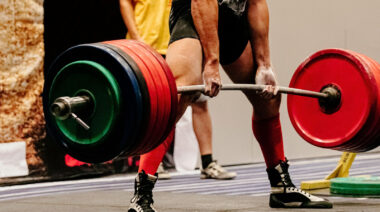My college roommate told me that he thinks of me as a guy who listens to moody, poetic, eclectic music alone in his room. He told me this after I shared my existential crisis during my early twenties with him.
My college roommate told me that he thinks of me as a guy who listens to moody, poetic, eclectic music alone in his room. He told me this after I shared my existential crisis during my early twenties with him.
Calm Me Down, Bob(s)
When I started powerlifting, I was at peak aggressive masculine energy. Getting amped up to lift heavy wasn’t a problem. I had the opposite problem—controlling my intensity.
I’d get too worked up and couldn’t focus my energy on doing the lifts well.
Then, I started playing music at the gym that I’d usually listened to while relaxing at home. At that time, I was listening to a lot of Bob Dylan and Bob Marley. Not sure why I listened to both Bobs so much at the time, but it’s also when I had long hair.
Marley’s melodies and Dylan’s reflective lyrics lowered the noise in my head, unlike rap or hard rock that just heightened the static.
My new gym music helped me self-regulate, and my lifting improved.
The King of Pop’s Cue
When I became more competitive in powerlifting, I trained and worked under my mentor, Bill Gillespie. Bill is widely admired in the sport of powerlifting and professional strength and conditioning.
A group of us, led by Bill, trained simultaneously on the same days each week for years. Bill went through a period where he played Michael Jackson’s greatest hits album every single training session—Same songs, same Michael, same album, repeat.
I liked Michael, still do, but after a while, it became maddening. Then, one day, the madness disappeared, and I didn’t hear anything anymore, only a low hum.
I never bothered to ask Bill why he did this, but I overheard him explaining it to a friend sometime later. He constantly played this type of music for the football players he coached during their workouts and for us. He explained to his friend that he wanted a constant.
Every time we heard this music, we knew it was time to work. The man knew what he was doing. The music was a subliminal cue of sorts in our heads.
Auditory cues can be pretty effective. We hear a song, and it prompts a memory, causes a feeling, or triggers us to perform.
That’s what happened with all of us unknowingly going through Bill’s experiment.
It also taught us to lift undistracted and without any dependency on anything external. We didn’t need music to get us in any state, and nothing could distract us and take us out of our focus.
The Jazz Rewire
I started listening to jazz when I was a kid, and my love for it grew as I got older.
When I took up Olympic weightlifting again, I started listening to it almost obsessively, which probably wasn’t a coincidence. I’d listen to jazz in the morning, on my way to work, and often when I trained.
John Coltrane’s album, A Love Supreme, was my first choice to play while lifting weights.
I first started playing jazz while I practiced the snatch and clean and jerk because I loved the music. But I kept using it during training because I realized it helped me relax my mind’s analytical function.
It helped me find a condition of mind that was a sort of effortless awareness, almost as if I was curiously noticing my actions and movements while staying detached from them.
There’s evidence that jazz influences brain-wave activity to:
- Help you focus
- Bring out the expressive parts
- Even raise your heart rate
When I put on Coltrane and grabbed the bar, I was sensitive to every movement and change. I switched from conscious thought to be in the moment.
With all his artistic improvisations, John Coltrane’s freestyle jazz fed a mental state more like an artist with a headful of colorful impressions trying to paint a picture than a scientist analyzing movement mechanics.
Music You’d Listen to in Skinny Jeans
Music has influenced who I am more than lifting weights did. It got a hold of me before the drive to become athletic and strong.
My training never determined the music I listened to, but my music has always influenced my training and thinking.
Early on, I told my college roommate I was thinking of quitting powerlifting and that I was worried it had already become too much a part of my identity.
But he didn’t see it that way. He saw me as someone guided by music. And it can be a pretty significant guiding force.
I spent a lot of time by myself or in messy, shitty apartments with friends who looked like the dude from The Big Lebowski listening to music.
The powers that be labeled most of what we listened to as Indie-folk. I’m not sure what that means, but we didn’t care. We just loved the picture that the music drew.
I was never interested in listening to music I was supposed to as a big, burly man. My taste made music a tool for me to use any way I wanted.
The benefits of music for athletic and lifting performance can be too simplified.
Coaches always bring up some studies regarding how music helped participants perform a certain percentage better. Then, these coaches share their own ideas on how listening to their personal favorite rock, hip-hop, or electronic dance music can make you more aggressive and lift more weight.
The conversation quickly digresses to personal opinions without thinking about what kind of music and how the researchers were using the music. Music was never only just a way for me to make myself more aggressive to no aim. I think music like this has a place, but it’s not always what’s needed or most helpful.
More than anything else, music has helped me learn a visceral connection to movement and lifting weights.
My music connection was free from the problem-solving mind. There have been times I would sit still before training to listen to artists like Bright Eyes and Sigur Ros because it would quiet my monkey brain. It would reshape an experience that could be gray and mundane.
Instead of a box to be checked off for the day, music helped me to creatively lift weights and open my senses—full of color and energy.
That’s what music is for, to open and feel the inexpressible as it is already. It’s not a supplement to force an emotion.
It’s a gift that allows for the release and surrender to feeling, not its control.






